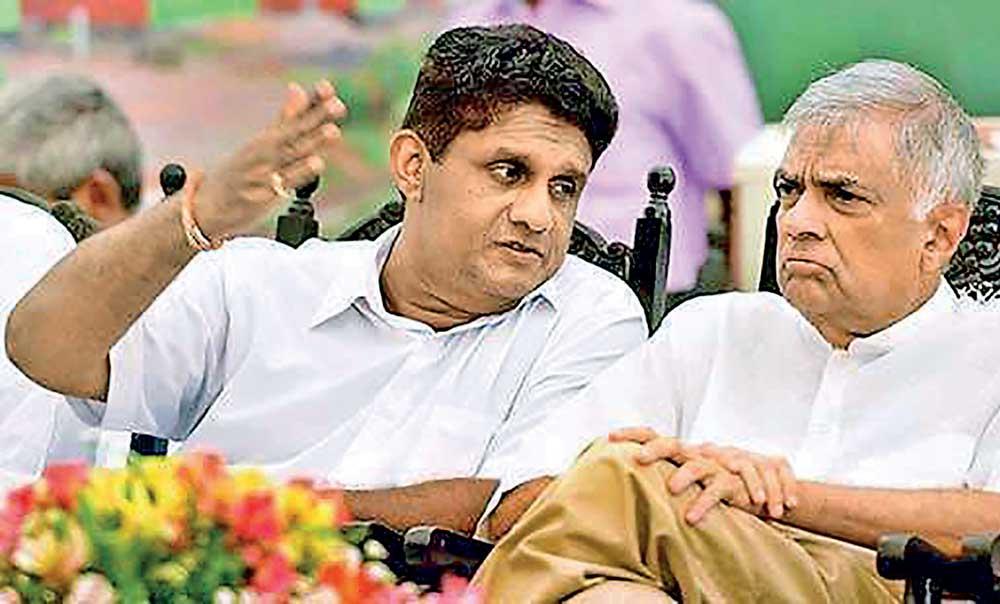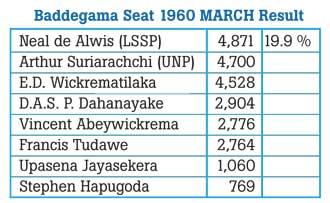Reply To:
Name - Reply Comment

A coalition between the two factions of the UNP, led by outgoing President Ranil Wickremesinghe and Opposition Leader Sajith Premadasa, would have presented a stronger and more unified front, changing the outcome of the election
|
The failure of the two factions of the United National Party to set aside differences and collaborate for the greater good of the party has now resulted in a missed opportunity A sense of superiority isolates them, making them believe they are above reproach or beyond the need for compromise; this mindset not only alienates allies but also weakens their position by making them less adaptable to the realities of changing political landscapes Until a General Election, all parties must prioritise the nation’s stability over political differences; extending a cooperative hand to the new President is essential to ensure that critical government functions continue, and that the country avoids falling into chaos |
 The people have made their choice; in a democracy, we must respect that decision with dignity, although for the first time in four decades, a winner has been declared in a Sri Lankan Presidential Election with less than half the population voting in favour. The focus should not be on percentages and statistics but rather on the fact that the people have exercised their right to vote, and the outcome reflects their will. Democratic principles demand that we uphold the legitimacy of the results, regardless of how close or divided the electorate may seem.
The people have made their choice; in a democracy, we must respect that decision with dignity, although for the first time in four decades, a winner has been declared in a Sri Lankan Presidential Election with less than half the population voting in favour. The focus should not be on percentages and statistics but rather on the fact that the people have exercised their right to vote, and the outcome reflects their will. Democratic principles demand that we uphold the legitimacy of the results, regardless of how close or divided the electorate may seem.
In the March 1960 Parliamentary Elections, under the first-past-the-post system, a candidate in Baddegama was elected as the representative despite receiving just 19.9% of the valid votes. The detailed results are provided in the table.
US System
In the USA, the winner-take-all system used by most states — where all of a state’s electoral votes are given to the presidential candidate who wins the popular vote within that state — can result in a candidate becoming president without winning the national popular vote. These “wrong-winner” elections occur when a candidate wins one or several states by slim margins but loses the rest of the country by a larger margin. Of the 46 U.S. Presidents, five have been elected this way. This has happened twice in the 21st century, including the 2016 Trump vs. Clinton election, and three times in the 19th century.
 The winner must acknowledge the reality that without at least half of the people’s approval, it becomes a challenging task to govern effectively. Governing in such a situation requires not only understanding but also addressing the concerns and aspirations of those who did not support them. It is essential to recognise that a divided electorate presents unique challenges, and to succeed, the leader must strive to build trust and credibility across the entire population. Therefore, the responsibility lies in working diligently to win back the confidence of the majority who voted against him, by showing responsiveness, inclusiveness, and commitment to addressing the needs of all citizens, regardless of how they voted. This approach will be critical in ensuring stable, effective governance and fostering national unity.
The winner must acknowledge the reality that without at least half of the people’s approval, it becomes a challenging task to govern effectively. Governing in such a situation requires not only understanding but also addressing the concerns and aspirations of those who did not support them. It is essential to recognise that a divided electorate presents unique challenges, and to succeed, the leader must strive to build trust and credibility across the entire population. Therefore, the responsibility lies in working diligently to win back the confidence of the majority who voted against him, by showing responsiveness, inclusiveness, and commitment to addressing the needs of all citizens, regardless of how they voted. This approach will be critical in ensuring stable, effective governance and fostering national unity.
If President Anura Kumara Dissanayake fully grasps the situation he finds himself in, he has the potential to succeed in his position, despite having garnered less than half of the popular vote. His party and its supporters must act responsibly by making a genuine effort to bring together a divided society. The challenge of gaining widespread public support to stabilise the economy will be even more daunting in such a polarised environment. Understanding the challenges that come with being elected by a minority of the population is crucial for him to navigate the complexities of governance.
To thrive in his role, he must be proactive in addressing the concerns of not just his supporters, but also those who opposed him in the election. By focusing on inclusive leadership and bridging the gap between different segments of society, President Dissanayake can work to build broader support. His ability to listen, engage in meaningful dialogue, and deliver results that benefit the entire nation will be key in overcoming the limitations of his initial popularity.
If he approaches his presidency with humility, transparency, and a willingness to adapt, he can transform his position into one of strength and unity, ultimately earning the trust and respect of the majority, even if they were not initially in his camp. His success will depend on his ability to rise above the numbers and focus on effective leadership that resonates with the whole country.
Since the new President has only three parliamentary seats, which is insufficient for him to independently form a functioning government, it becomes the primary responsibility of the other 222 parliamentarians to offer genuine support. Without such cooperation, governance will be severely hampered, risking an unstable and anarchic situation.
Until a General Election is called following a dissolution of Parliament, all parties must prioritise the nation’s stability over political differences. Extending a cooperative hand to the President will be essential to ensure that critical government functions continue, and that the country avoids falling into chaos. This period of governance, though transitional, requires unity and collaboration to prevent an institutional breakdown, maintaining the confidence of the public and safeguarding democratic processes.
By working together during this time, parliamentarians can help steer the country toward a more stable political environment, where the government can effectively serve its people until a new electoral mandate is granted.
The two factions of the United National Party, led by outgoing President Ranil Wickremesinghe and Opposition Leader Sajith Premadasa, will likely regret their decision to contest the election and lose. A significant and impressive segment from both factions had urged their leaders to unite before the election. Forming a coalition would have presented a stronger and more unified front, potentially changing the outcome of the election. However, the failure to set aside differences and collaborate for the greater good of the party has now resulted in a missed opportunity. Sajith may now face internal scrutiny from his faction, reflecting on what could have been a more strategic approach to securing power.
As quoted by Aiki Flinthart in ‘The Yu Dragon’, “Four things come not back: the spoken word, the sped arrow, the past life, and the neglected opportunity,”; this saying serves as a powerful reflection on the irreversible nature of certain moments in life. Flinthart, through this quote, underscores the importance of being thoughtful and intentional in our actions, as once these elements — words, actions, time, and missed opportunities — are gone, they can never be retrieved. The quote acts as a reminder to live with awareness, responsibility, and a sense of urgency when it comes to seizing the opportunities that present themselves and being mindful of the consequences of our words and deeds.
A sense of superiority further isolates them, making them believe they are above reproach or beyond the need for compromise. This mindset not only alienates allies but also weakens their position by making them less adaptable to the realities of changing political landscapes. Ego, when left unchecked, can fuel decisions based more on personal pride than the greater good, leading to hasty, poorly thought-out actions that reflect a lack of maturity and wisdom.
Together, these characteristics strip away the qualities of effective leadership, such as empathy, foresight, and pragmatism, reducing them to figures who are more concerned with maintaining an image of power than with serving the people or building a legacy of lasting impact. As a result, they come across as immature, unwise politicians who fail to inspire confidence or foster unity.